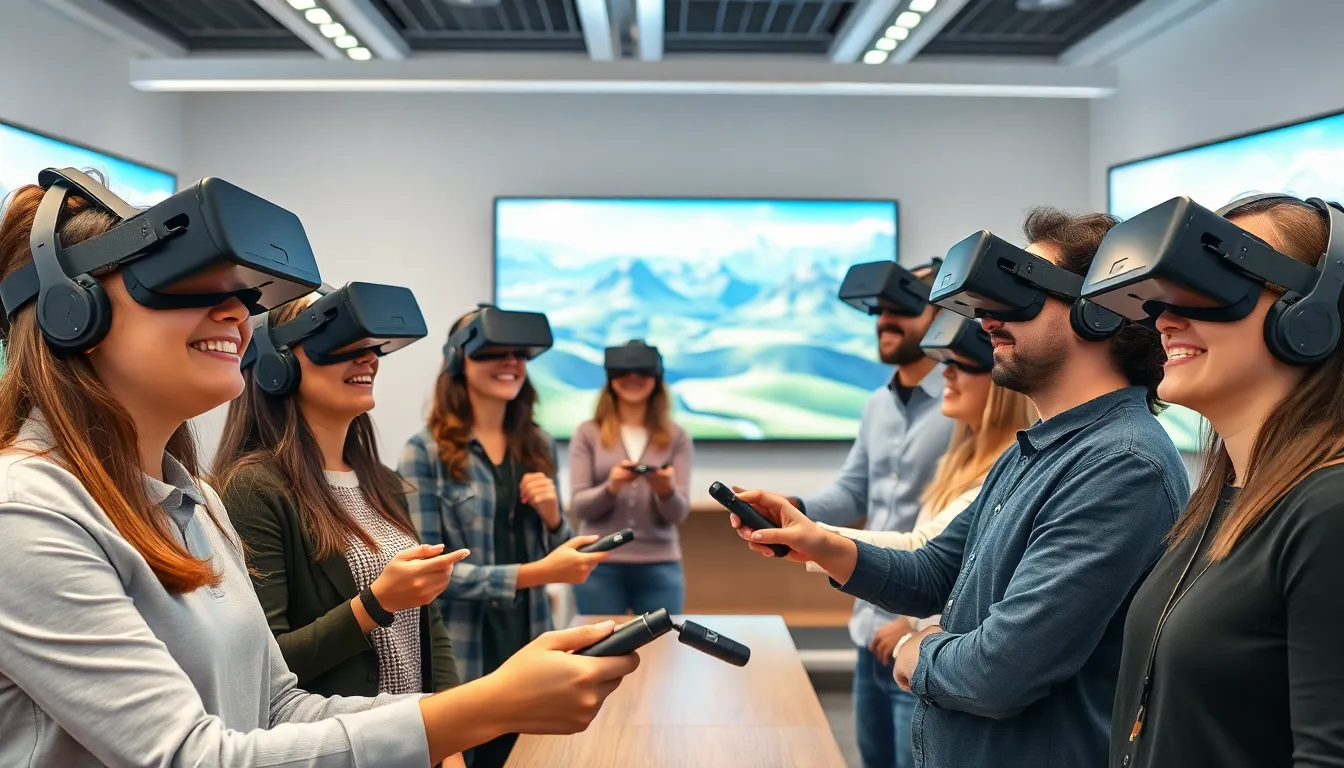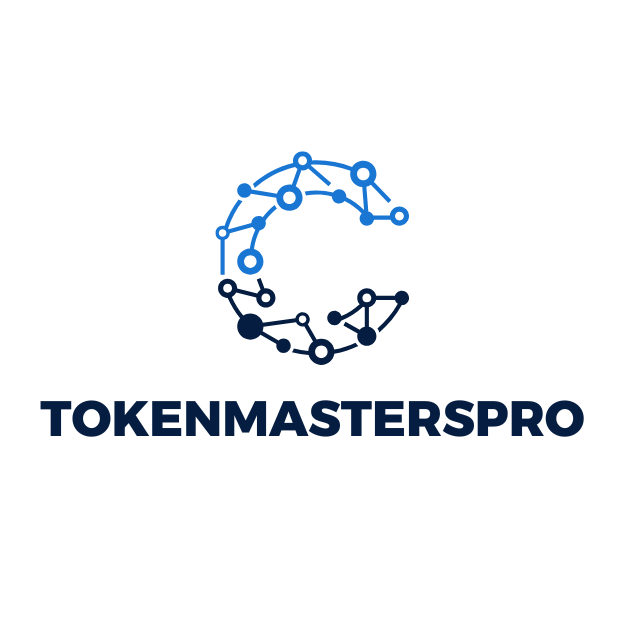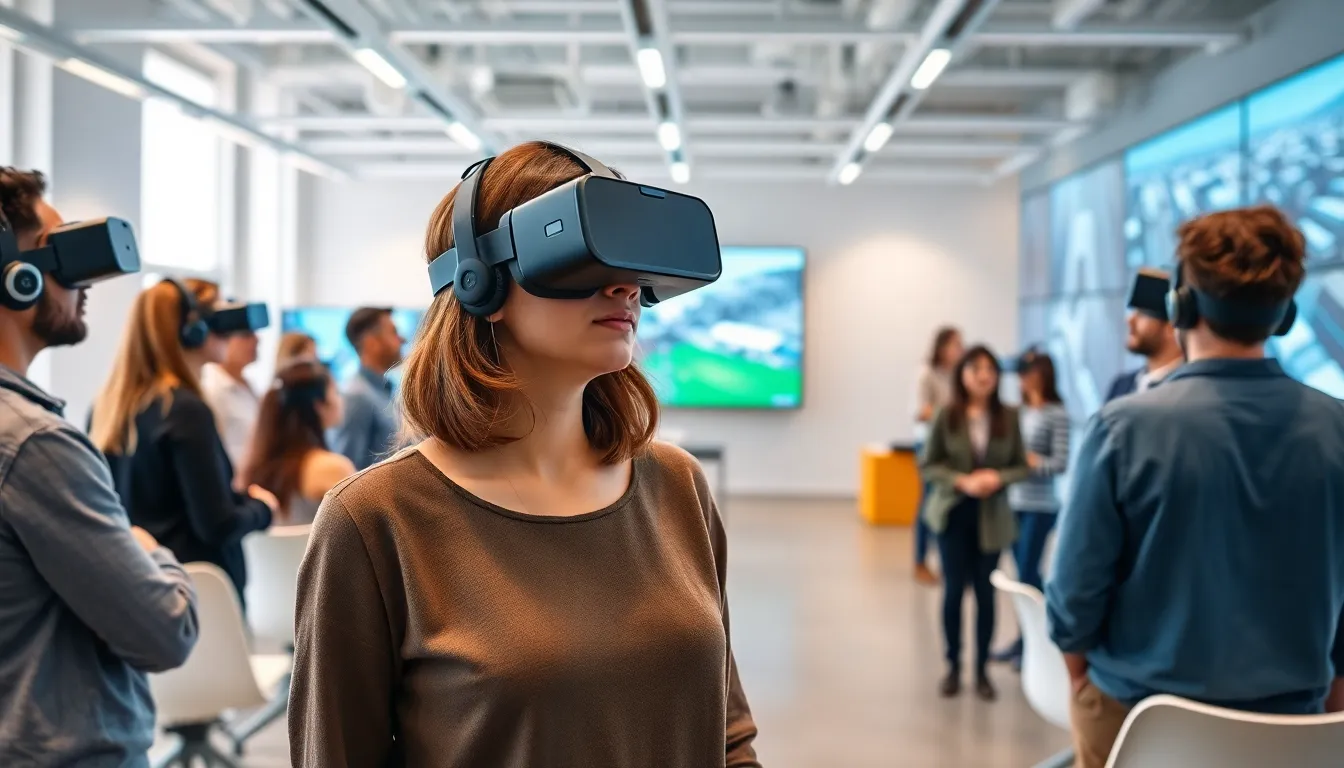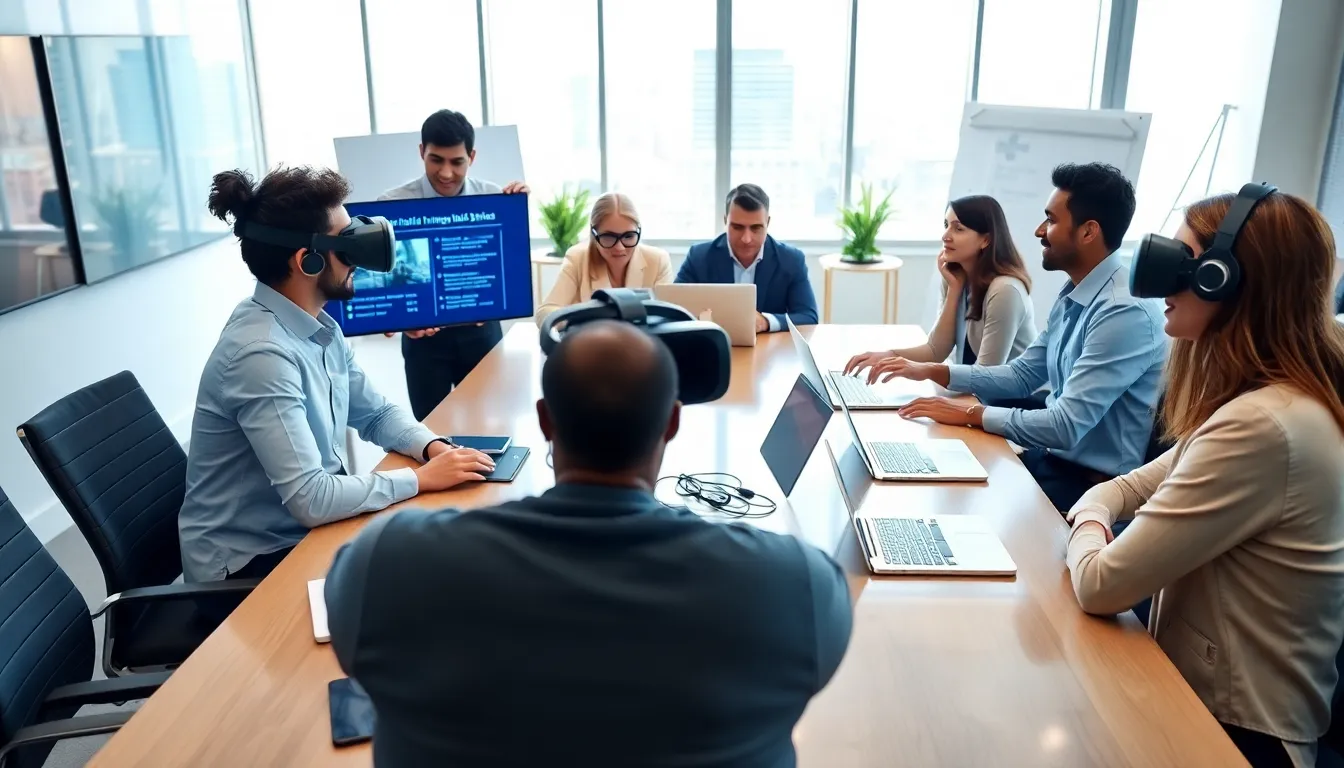Imagine stepping into a world where creativity knows no bounds and learning feels like an adventure. Welcome to the realm of VR workshops, where participants swap traditional classrooms for immersive experiences that make even the most mundane subjects feel like a thrilling video game. Gone are the days of nodding off during lectures; now, they can explore, create, and collaborate in virtual landscapes that spark innovation and engagement.
Table of Contents
ToggleOverview of VR Workshops
VR workshops create immersive experiences that enhance learning. Participants engage in interactive environments designed to foster creativity and collaboration. Traditional methods of instruction evolve into dynamic, virtual platforms where information transfer occurs in stimulating ways.
These workshops often incorporate various technologies like VR headsets, motion capture systems, and interactive software. As a result, learners actively participate rather than passively absorb content. VR technology immerses individuals in realistic scenarios, encouraging critical thinking and problem-solving skills.
Many educators report significant improvements in retention and understanding when using VR. Studies show that learners retain up to 70% of information presented in virtual environments compared to 20% in traditional settings. Participants express higher levels of satisfaction with their learning experience, citing increased motivation and engagement.
Industry professionals benefit from specialized VR workshops tailored to specific skill sets. These sessions often include simulations relevant to real-world situations, allowing learners to practice skills in safe settings. Workshops adapt to various sectors, including education, healthcare, and corporate training, providing customized solutions for diverse audiences.
A growing number of organizations recognize the value of VR workshops in fostering teamwork and innovation. Team-based activities promote collaboration among participants, enabling them to leverage collective strengths. Through shared experiences in virtual spaces, teamwork becomes natural and instinctive.
Ultimately, VR workshops redefine learning landscapes, making education more interactive and relevant. As the technology continues to advance, the potential for rich, engaging learning experiences expands, enhancing the future of education.
Benefits of VR Workshops

VR workshops transform traditional learning into immersive experiences. They enhance engagement and provide substantial advantages in various contexts.
Enhanced Learning Experience
Active participation in VR workshops enhances retention and understanding. Research shows learners retain up to 70% of information in virtual environments. Engaging with content in an interactive space motivates learners to explore, create, and collaborate. These workshops often incorporate simulations that reflect real-world scenarios, enabling hands-on practice. Participants can visualize complex concepts, making learning more intuitive. Using VR tools fosters creativity and critical thinking skills that might remain stagnant in conventional settings. Immersion in virtual landscapes also reduces distractions, allowing individuals to focus better on the material. Overall, VR workshops elevate the educational experience significantly.
Accessibility for Diverse Audiences
VR workshops cater to a variety of learning styles and needs. Individuals with disabilities may find enhanced accessibility through virtual interactions. Customizable settings within VR allow for different sensory experiences, accommodating various preferences. Additionally, remote access opens opportunities for learners from diverse geographical locations. Participants can connect and collaborate without the constraints of physical proximity. Organizations can tailor content to meet specific sector demands, thereby enriching the experience for all involved. Incorporating multilingual support further broadens outreach, ensuring inclusivity. Thus, VR workshops create inclusive environments that engage a wider audience effectively.
Technology Behind VR Workshops
VR workshops rely on advanced technologies that enhance learning experiences. Understanding the core components involved reveals their transformative power.
Hardware Requirements
VR workshops require specific hardware to function effectively. High-quality VR headsets, such as the Oculus Quest and HTC Vive, deliver immersive visuals. Tracking controllers enhance interactivity, allowing participants to engage directly with the virtual environment. Powerful computers or game consoles support these systems, ensuring smooth operation. For optimal performance, graphics cards like NVIDIA GeForce RTX series are preferred. Motion capture technology elevates user experience, enabling real-time movement tracking. This combination of hardware creates a compelling and engaging learning experience.
Software Platforms
Numerous software platforms cater to VR workshops, facilitating diverse educational needs. Unity and Unreal Engine serve as popular development environments, allowing creators to build immersive applications. Learning Management Systems (LMS) such as Moodle and Blackboard integrate VR modules, enhancing traditional educational frameworks. VRChat and Engage provide social interaction spaces, allowing participants to collaborate within virtual settings. Custom software solutions often emerge in specialized fields, ensuring tailored experiences. This flexibility in software ensures VR workshops adapt to specific learning objectives and audience demands.
Popular VR Workshop Examples
VR workshops find great applications in various sectors, showcasing their versatility and effectiveness. This section highlights key examples within educational institutions and corporate training.
Educational Institutions
VR workshops in educational institutions enhance student engagement through immersive learning environments. Schools utilize virtual reality to explore complex subjects, such as anatomy or history, allowing students to interact with realistic simulations. For instance, a biology class may employ VR to demonstrate human anatomy in 3D, facilitating a deeper understanding of the subject matter. Research shows students involved in these workshops retain around 70% of learned material compared to a mere 20% in traditional classrooms. Additional benefits include increased collaboration among students, enhancing their teamwork skills and social interaction. Overall, educational institutions embrace VR workshops to create dynamic learning experiences, adapting to various learning styles and improving knowledge retention.
Corporate Training
Corporate training increasingly incorporates VR workshops to develop employee skills in a realistic, safe environment. Businesses implement these workshops for simulations related to specific tasks or emergency scenarios. For example, a VR training program can prepare employees for high-stress situations, such as emergency evacuations, ensuring they can respond effectively. Effective training boosts employee confidence, as they practice decision-making in simulated environments. Furthermore, companies report improved teamwork through collaborative VR exercises that provide opportunities to strengthen communication skills. With statistics indicating retention rates of roughly 70% in VR scenarios, corporate training programs leverage this technology to enhance workforce competencies and drive organizational growth.
Future Trends in VR Workshops
Emerging technologies will continue to reshape VR workshops significantly. Advances in artificial intelligence personalize learning experiences, adapting content to individual users’ preferences and learning speeds. Augmented reality integration may enhance immersion by superimposing digital information onto the real world, creating a blended educational environment.
As 5G technology expands, increased bandwidth enables smoother interactions and more complex simulations. More users can access high-fidelity VR experiences simultaneously, redefining remote collaboration. Social VR platforms will likely grow, fostering deeper connections among participants through shared experiences in virtual environments.
Gamification remains a crucial trend in VR workshops. Incorporating game-like elements enhances motivation and engagement, transforming learning into a fun and interactive process. Competition elements such as leaderboards may stimulate enthusiasm for skill development and collaboration.
The focus on soft skills will increase in VR training modules. These skills, crucial for workplace success, include communication, teamwork, and problem-solving. Workshops that simulate real-world scenarios provide safe spaces for participants to practice and refine these essential abilities.
Sustainability initiatives are also gaining traction. Environmentally conscious practices in VR workshop production and implementation will align with growing global concerns. Organizations that adopt eco-friendly solutions may attract a more socially responsible audience.
Finally, continual development in hardware and software ensures VR workshops remain cutting-edge and effective. Innovations in headset designs aim for lighter weights and improved comfort, enhancing usability during extended sessions. High-quality audio experiences contribute to creating realistic environments, further elevating participant engagement.
These trends together signify a bright future for VR workshops, promising more immersive, effective, and inclusive learning experiences across various fields.
VR workshops are revolutionizing the way people learn by creating immersive and interactive environments. They not only enhance engagement and retention but also cater to diverse learning styles and needs. As technology continues to advance the potential for VR workshops will only grow, making education more relevant and dynamic.
The shift towards these innovative learning experiences reflects a broader trend in education and training that prioritizes active participation and collaboration. With the integration of cutting-edge hardware and software, VR workshops are set to redefine traditional learning landscapes, paving the way for a more inclusive and effective educational future.



